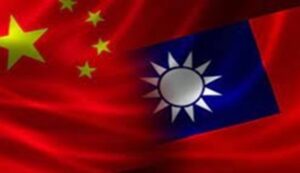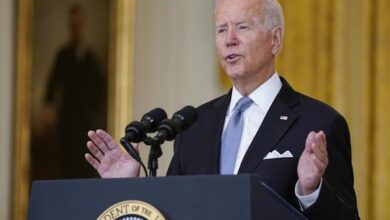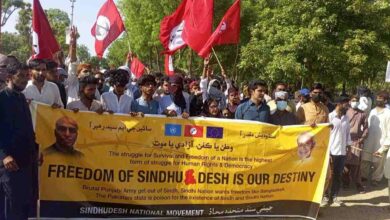The secret to preventing a Chinese invasion of Taiwan is deterrence
Hong Kong: From December 9–11, China’s military and maritime law enforcement forces conducted more aggressive exercises outside Taiwan than they had since the Taiwan Strait Crisis of 1996. They symbolized Beijing’s opposition to Taiwanese President Lai Cheng-te’s visit to Guam and Hawaii. The unannounced exercises, which included dozens of planes and some 90 Chinese coast guard and military vessels, covered a wider geographic region than prior exercises.

It’s interesting to note that as other PLA ships and planes surrounded Taiwan, PLAN ships created two “walls” east of Taiwan to limit access to the First Island Chain. PLA planes pretended to strike and drive away enemy aircraft and ships at the same time. In fact, the primary goal of this drill was to keep outside forces from meddling with Taiwan’s sovereignty.
It was characterized as “total military intimidation” and an attempt to control seas in the “inner part of the island chain” by one Taiwanese official. In contrast to other times, China did not publicize the drill in advance, which is probably an effort to manipulate Taiwan as Beijing intensifies its pressure on Lai’s administration.
“It’s the PLA’s lofty mission to protect national sovereignty and territorial integrity, safeguard the fundamental interests of the Chinese nation, and defend the shared interests of compatriots on both sides of the strait,” Senior Colonel Wu Qian, a spokesman for the Chinese Ministry of National Defense (MND), finally gave a belated explanation for the wargames on December 13.
“There are no constant conditions in warfare, just as water has no constant form,” Wu said in a cryptic manner. Depending on the requirements and conditions on the ground, the PLA will choose whether and when to conduct military drills. Put another way, it provided no justification for its military actions, even though Taiwan had well anticipated them.
Wu said, “The PLA will never be absent or reluctant in fighting ‘Taiwan independence’ and advancing national reunification, whether or not there is a military drill. Any effort to divide the country by using force or enlisting outside assistance will be penalized and ultimately unsuccessful. Naturally, Taiwan and communist China are already two separate countries since they have never supported the same cause in the past.
The Taiwanese government established an emergency operations center on December 9 to keep an eye on PLA activities as a result of Chinese moves. “China’s long-term goal of deterring regional parties and disrupting the rule-based international order will not be endorsed by the international community,” Taipei said in response to Beijing’s oppressive tactics.
This significant drill came after one that issued a warning against “separatist acts” in October. According to the MND, “The Chinese PLA will keep on strengthening war-preparedness training and resolutely foil any separatist attempts to seek Taiwan independence and interference by external forces.”
The Chinese Foreign Ministry said on December 12 that Taiwan’s governing Democratic Progressive Party’s (DPP) plan to secede and pursue “Taiwan independence” is destined to fail. Since the DPP is only upholding the existing quo rather than proclaiming independence, Beijing is obviously couching its venom in flagrant lies.
China bases its arguments on the DPP being the primary offender and claims that Taiwanese leaders are suffering as a result of its actions. In actuality, China is entirely to blame for escalating tensions rather than Taiwan or the United States.
“I’d like to reiterate that there’s only one China in the world, and Taiwan is an inalienable part of China,” said Mao Ning, a spokesman for the foreign ministry; however, this is just another unsupported falsehood. The Chinese Communist Party (CCP) intentionally misrepresents history and intimidates people, and the world must acknowledge this. Future decisions should be made by Taiwan’s 24 million inhabitants, not the CCP.
China talks eloquently about the oneness of the “sons and daughters of China” and the close relations between Taiwan and China. But in order to maintain the legitimacy of the CCP, the party also feeds patriotic fervor at home. Since the people of Taiwan take China’s threats of military action seriously, it is not surprising that there is little desire for Taiwan to declare its independence. However, by making threats, the CCP has put itself in a difficult position since failing to carry them out would damage its reputation with the Chinese people.
The question of whether China would dare to invade Taiwan and when it is most likely to do so are hotly debated topics. Former US Office of Naval Intelligence chief Rear Admiral Mike Studeman made an appearance on the “Why Should We Care about the Indo-Pacific?” podcast in June. “It is evident that Xi Jinping wants Taiwan options before the mid-2030s,” Studeman said. He has been preparing his populace, military, authorities, and people for Taiwan’s recovery.
Additionally, he said that Xi is quite transparent about his goals. From 2035 to 2027, he expedited a few modernization objectives. Additionally, the PLA is celebrating its centennial, which marks one hundred years since its founding. Additionally, “He has taken a variety of actions to be ready to plunge his nation into a conflict. All of these preparedness indicators—military, governmental, leadership, and economic—point to a very serious nation that is rushing to attempt to do something that its leader is dictating they must.”
Stuteman cautioned, “History is rhyming a lot, and we’d be wise to take Xi at his word.” “We need to take it seriously and not be naive about what our adversary may be intending,” he added, alluding to the United States. If you’re skilled at deterrence, I think you can really do it. However, I believe it’s deteriorating, and we still have work to do.
According to the former admiral, deterrence is a multifaceted issue for the United States that goes beyond military might. “Otherwise we’re fated to actually see this thing transpire, and the whole world will be a loser from it.” Since any invasion of Taiwan would have a negative impact on the global economy, it entails creating a network of nations to fend against Chinese aggression. According to Studeman, China’s careless actions may have cost the world $10 trillion, or 10% of its GDP.
The PLA’s ongoing problems and corruption are one factor impeding Chinese goals. As a result, Studeman said, “Xi Jinping believes the PLA isn’t quite ready today. In what way can we persuade him that they will not be prepared in three, five, seven, nine, etc. years? Therefore, this is something we must do.
The UK-based Council on Geostrategy produced a primer titled “Taiwan Invasion Is Not Likely, but Deterrence Remains Vital” that included further ideas on how to prevent China from invading Taiwan. Parton said that the most crucial step in stopping Chinese aspirations to annex Taiwan is deterrence.
Incidentally, the ideal course of action for other nations that are at odds with China, including the Philippines and India, is deterrence.
“Up until now, the focus has been on military deterrence,” Parton said. It has a role. Since it is improbable that European troops would be ready in adequate numbers or time, military deterrence is primarily the duty of the United States. However, if they have the capacity and the Taiwanese ask for particular assistance, other free and open nations have to be prepared to assist Taiwan in strengthening its “porcupine defense.” Training would be a part of it.
Economic effects also serve as a significant disincentive. Forceful unification will result in embargoes and penalties, which the CCP must be aware of well in advance. “Warning should be given quietly but with conviction and in the near future.” Additionally, economic deterrence must be credible. “The demand for sanctions will be unstoppable in the case of an invasion or violent unification. Governments must acknowledge this right away and convince the CCP of the impending doom.
War would worsen the already deteriorating Chinese economy and growing social unrest. China’s economy depends heavily on exports in the face of poor domestic demand. These exports would be destroyed by war. The South China Sea is where almost 30% of global commerce flows, and this would have an instant effect on the markets in China, Japan, and South Korea. The security of food and energy must also be taken into account by Beijing.
For instance, 80% of China’s oil imports pass via the Sunda and Malacca Straits, which are readily blockaded, despite efforts to diversify supplies.
Parton thinks Beijing should be deterred from invading Taiwan by the threat of economic catastrophe. The CCP’s primary goal is, after all, regime survival. When the populace came to the streets in 1989, the party was in danger of being overthrown. Is it prepared to confront the same possibility repeatedly?” Its recollection of that view over the cliff is marred. Parton said, “It won’t want a second look.”
In terms of military deterrence, an invasion of Taiwan is dangerous without exception. Think about the challenges Russia faced when it invaded Ukraine over a common land border. Given that soldiers would have to traverse the treacherous, 100-nautical-mile-wide seas of the Taiwan Strait, the PLA would face even more difficulties. There are just 14 beaches in Taiwan that can support amphibious landings, and seaborne assaults are risky and violent. The geography of Taiwan is mountainous, which is advantageous to the defense.
In order to hit the PLA where it hurts the most, Taiwan’s military is also bolstering asymmetric capabilities, or “porcupine defenses.” The United States of America defending Taiwan must also worry Beijing.
“Can Taiwan Resist a Large-Scale Military Attack by China?” is the title of another study, this one by the RAND Corporation. The writers of “Evaluating Strengths and Vulnerabilities in a Potential Conflict” took into account a number of possible outcomes, including an amphibious assault, a coordinated blockade campaign, a Chinese conventional missile attack, and intensive media operations.
One of the writers’ many important findings is that Taiwan’s civilian leadership must be of the highest caliber. First, observers should closely monitor the level of social cohesiveness in the run-up to a crisis or war, as well as the strength and caliber of Taiwan’s political leadership, to get insight into the island’s ability to withstand an assault. The long-term vulnerabilities of the island and the condition of Taiwan’s military should be considered secondary.
Regarding the caliber of Taiwan’s military, the RAND assessment said, “Second, Taiwan’s lack of soldiers and weapons does not mean that it will lose. Taiwan may take significant action to increase its military’s effectiveness. However, due to China’s vast resource advantage, China’s military advantage is expected to continue to rise even if Taiwan’s military significantly increases its combat efficiency. In light of these developments, Taiwan’s capacity to repel a significant Chinese assault will depend more on the quality of its social cohesiveness and political leadership than on any other factor.
Thirdly, “In a major war, the impact of significant casualties and economic loss would probably cut both ways.” At first, the people of Taiwan would probably support the national government and want to oppose an aggressive China. But in the long run, the high expenses of war would probably make people less inclined to favor keeping the war going. The degree of social cohesiveness and the quality of Taiwan’s political leadership may have an impact on how popular support eventually evolves over time.
“Finally,” the study said, “because of Taiwan’s military disadvantages and low durability, successfully withstanding a large-scale Chinese attack would require military intervention by the United States.”
Meanwhile, the PLA is practicing how to blockade or attack Taiwan. Its air, naval, and missile exercises serve a purpose by laying the groundwork for a direct assault. China normalizes its coercive actions each time it exercises or harasses, exhausting Taiwan’s defenders and psychologically implying that resistance to eventual unification with China is pointless.
Parton summed up by saying, “Xi’s decisions have at least some logic and rationale, regardless of whether they have always been right. That reasoning ultimately stems from the unwavering drive to hold onto power. However, there is no need to take the risk of invading Taiwan.
The researcher said, “If a full blockade or invasion is not on the cards, the CCP has little choice but to continue with the current strategy: to try to break the will of Taiwan’s people and to convince them that ‘reunification’ is ‘irresistible and inevitable.’.”





